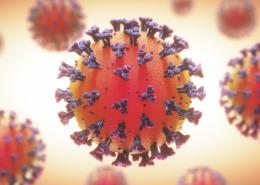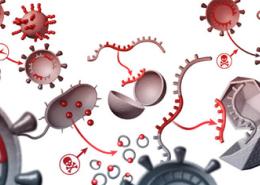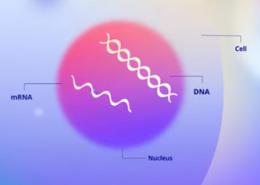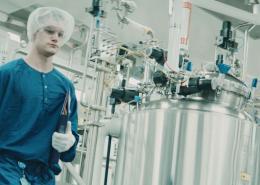Pfizer and BioNTech Announce Publication of Peer-Reviewed Data from Ongoing Phase 1/2 study of mRNA-based Vaccine Candidate, BNT162b1, Against SARSCoV-2 in Nature
NEW YORK and MAINZ, GERMANY, August 12, 2020 — Pfizer Inc. (NYSE: PFE) and BioNTech SE (Nasdaq: BNTX) today announced that preliminary, peer-reviewed data from their BNT162 mRNA-based vaccine development program, Project Lightspeed, against SARS-CoV-2, were published online in the journal Nature. These preliminary clinical data on BNT162b1, a nucleosidemodified messenger RNA (modRNA) candidate that encodes an optimized SARS-CoV-2 receptor binding domain (RBD) antigen, showed that BNT162b1 was administered at a dose level that was well tolerated and generated dose dependent immunogenicity, as measured by RBD-binding IgG concentrations and SARS-CoV-2 neutralizing titers. These data were made available to the public on July 1, 2020 via an online preprint server, Medrxiv. For additional details, please read the previously issued press release.
The posted preprint version of the manuscript reported that, by 7 days after the second dose, 30 g of BNT162b1 elicited a SARS-CoV-2 neutralizing geometric mean titer (GMT) 2.8-times the GMT of a SARS-CoV-2 convalescent human serum panel. Based on new data, the final, peer reviewed paper reports that neutralizing titers continued to rise, and, by 14 days after the second dose of 30 g, the participants’ GMT was 4.6-times the convalescent serum panel GMT.
“The publication of peer-reviewed data from our mRNA-based vaccine development program against SARS-CoV-2 in a world-renowned publication like Nature provides further validation of our rapid progress toward developing a safe and effective potential vaccine to help address this current pandemic,” said Kathrin U. Jansen, Ph.D., Senior Vice President and Head of Vaccine Research & Development, Pfizer. “We are encouraged by the overall advancement of the program and look forward to generating additional data from our ongoing studies.”
“Since our inception, we have been deeply grounded in science, which makes sharing our data in a peer-reviewed publication like Nature an even more important milestone. The scientific rigor of our approach is fundamental during the current pandemic. Supporting the growing body of knowledge is instrumental for finding answers to benefit global health,” said Ugur Sahin, M.D., CEO and Co-founder of BioNTech. "We aim to continuously follow that scientific rigor in reporting additional data from our global trials, which are ongoing at more than 100 clinical sites worldwide. Our aim remains to bring a safe and efficacious vaccine to the global community.”
The companies are also continuing the peer review process for initial data posted to the Medrxiv preprint server for BNT162b1 from the German Phase 1/2, open-label, non-randomized, nonplacebo-controlled, dose-escalation trial.
Pfizer and BioNTech recently selected BNT162b2 as the vaccine candidate to progress to a Phase 2/3 study, which is now enrolling. BNT162b2 was selected based on the totality of available data from preclinical and clinical studies, including select immune response and tolerability parameters compared to the BNT162b1 candidate. The companies are continuing to collect data from the Phase 1/2 trials and expect to submit data on BNT162b2 for peer review and potential publication in the near future. In keeping with their commitment to transparency, the companies intend to also post the manuscript on a preprint server at that time.
The Phase 2/3 study is an event driven trial that is planned to enroll up to 30,000 participants between 18 and 85 years of age. The companies plan to enroll a diverse population, including participants in areas where there is significant expected SARS-CoV-2 transmission. For further information about this trial, visit ClinicalTrials.gov using the number NCT04368728.
About Pfizer: Breakthroughs That Change Patients’ Lives
At Pfizer, we apply science and our global resources to bring therapies to people that extend and significantly improve their lives. We strive to set the standard for quality, safety and value in the discovery, development and manufacture of health care products, including innovative medicines and vaccines. Every day, Pfizer colleagues work across developed and emerging markets to advance wellness, prevention, treatments and cures that challenge the most feared diseases of our time. Consistent with our responsibility as one of the world's premier innovative biopharmaceutical companies, we collaborate with health care providers, governments and local communities to support and expand access to reliable, affordable health care around the world. For more than 150 years, we have worked to make a difference for all who rely on us. We routinely post information that may be important to investors on our website at www.Pfizer.com. In addition, to learn more, please visit us on www.Pfizer.com and follow us on Twitter at @Pfizer and @Pfizer News, LinkedIn, YouTube and like us on Facebook at Facebook.com/Pfizer.
About BioNTech
Biopharmaceutical New Technologies is a next generation immunotherapy company pioneering novel therapies for cancer and other serious diseases. The Company exploits a wide array of computational discovery and therapeutic drug platforms for the rapid development of novel biopharmaceuticals. Its broad portfolio of oncology product candidates includes individualized and off-the-shelf mRNA-based therapies, innovative chimeric antigen receptor T cells, bi-specific checkpoint immuno-modulators, targeted cancer antibodies and small molecules. Based on its deep expertise in mRNA vaccine development and in-house manufacturing capabilities, BioNTech and its collaborators are developing multiple mRNA vaccine candidates for a range of infectious diseases alongside its diverse oncology pipeline. BioNTech has established a broad set of relationships with multiple global pharmaceutical collaborators, including Genmab, Sanofi, Bayer Animal Health, Genentech, a member of the Roche Group, Genevant, Fosun Pharma, and Pfizer. For more information, please visit www.BioNTech.de.
BioNTech Forward-looking statements
This press release contains “forward-looking statements” of BioNTech within the meaning of the Private Securities Litigation Reform Act of 1995. These forward-looking statements may include, but may not be limited to, statements concerning: BioNTech’s efforts to combat COVID-19; the potential number of sites and participants in our Phase 2/3 trial; the collaboration between BioNTech and Pfizer to develop a potential COVID-19 vaccine; and our expectations regarding the potential characteristics of BNT162b2 in our Phase 2/3 trial and/or in commercial use based on data observations to date, including expected advantages over BNT162b1. Any forward-looking statements in this press release are based on BioNTech current expectations and beliefs of future events, and are subject to a number of risks and uncertainties that could cause actual results to differ materially and adversely from those set forth in or implied by such forward-looking statements. These risks and uncertainties include, but are not limited to: competition to create a vaccine for COVID-19; the ability to produce comparable clinical results in larger and more diverse clinical trials; the ability to effectively scale our productions capabilities; and other potential difficulties. For a discussion of these and other risks and uncertainties, see BioNTech’s Annual Report on Form 20- F filed with the SEC on March 31, 2020, which is available on the SEC’s website at www.sec.gov. All information in this press release is as of the date of the release, and BioNTech undertakes no duty to update this information unless required by law.
Pfizer Disclosure Notice:The information contained in this release is as of August 12, 2020. Pfizer assumes no obligation to update information or forward-looking statements contained in this release as the result of new information or future events or developments.
This release contains forward-looking information about Pfizer’s efforts to combat COVID-19, the BNT162 mRNA vaccine program, and a collaboration between BioNTech and Pfizer to develop a potential COVID-19 vaccine, including their potential benefits, anticipated publication of data, manufacturing and distribution and the expected timing of clinical trials, that involves substantial risks and uncertainties that could cause actual results to differ materially from those expressed or implied by such statements. Risks and uncertainties include, among other things, the uncertainties inherent in research and development, including the ability to meet anticipated clinical endpoints, commencement and/or completion dates for clinical trials, regulatory submission dates, regulatory approval dates and/or launch dates, as well as the possibility of unfavorable new preclinical or clinical trial data and further analyses of existing preclinical or clinical trial data; risks associated with preliminary data; the risk that clinical trial data are subject to differing interpretations and assessments, including during the peer review/publication process, in the scientific community generally, and by regulatory authorities; whether the scientific journal publications referenced above will occur and, if so, when and with what modifications; whether regulatory authorities will be satisfied with the design of and results from these and future preclinical and clinical studies; whether and when any biologics license applications may be filed in any jurisdictions for any potential vaccine candidates under the collaboration; whether and when any such applications may be approved by regulatory authorities, which will depend on myriad factors, including making a determination as to whether the product’s benefits outweigh its known risks and determination of the product’s efficacy and, if approved, whether any such vaccine candidates will be commercially successful; decisions by regulatory authorities impacting labeling, manufacturing processes, safety and/or other matters that could affect the availability or commercial potential of any such vaccine candidates, including development of products or therapies by other companies; manufacturing capabilities or capacity, including whether the estimated numbers of doses can be manufactured within the projected time periods indicated; uncertainties regarding the ability to obtain recommendations from vaccine technical committees and other public health authorities regarding any such vaccine candidates and uncertainties regarding the commercial impact of any such recommendations; and competitive developments.
A further description of risks and uncertainties can be found in Pfizer’s Annual Report on Form 10- K for the fiscal year ended December 31, 2019 and in its subsequent reports on Form 10-Q, including in the sections thereof captioned “Risk Factors” and “Forward-Looking Information and Factors That May Affect Future Results,” as well as in its subsequent reports on Form 8-K, all of which are filed with the U.S. Securities and Exchange Commission and available at www.sec.gov and www.pfizer.com.
Pfizer Contacts:
Media Relations
Jerica Pitts
+1 (212) 733-5060
[email protected]
Investor Relations
Chuck Triano
+1 (212) 733-3901
[email protected]
BioNTech Contacts:
Media Relations
Jasmina Alatovic
+49 (0)6131 9084 1513 or +49 (0)151 1978 1385
[email protected]
Investor Relations
Sylke Maas, Ph.D.
+49 (0)6131 9084 1074
[email protected]











